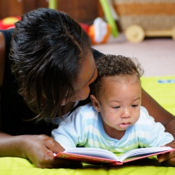 Q: Should parents be worried if children aren't talking by a certain age?
Q: Should parents be worried if children aren't talking by a certain age? A: I think it's a red flag if your child isn't saying anything in the first year, including babbling or cooing. They should be making some type of sounds. Usually, most children say their first words between 12 and 18 months, but that's not the same for every child. So if between 18 months and 2 years, your child does not have at least one or two words, that's when I would be a little concerned. The word doesn't have to be complete and intelligible-if the child says "ba" for "bottle," and uses it consistently for "bottle," then that is considered a word. Q: Is it beneficial for parents to teach their children sign language? Will that speed up or delay communication skills? A: I don't think there have been any evidence-based studies on whether using sign language can speed up or delay communications skills, but it doesn't hurt to encourage signs as long as you're encouraging oral communication along with the sign language. For example, if the child is saying "more" by putting their fingers together, you can imitate the sign, but you should accompany it with a phrase such as "Oh, you want more?" to encourage the association of the word "more" with the verbal word and to expand on the language. Q: Does reading to children have an effect on their speech and language*? A: Yes, and the literature on speech and language development supports this. Reading to children helps not only their oral and written communication, but even their social language. If they read along or help you turn the page, it helps them with attention and attending to a task. If they ask you to read more, it assists with speech. It helps to facilitate language because they learn the idea that there's a sequence to things and that's another way of communicating, by reading. Q: What can parents do to help their children expand their vocabularies? A: Talk to your children. I think parents think it's odd to talk a lot when they are alone with their child, but talking of any type helps. Children get their vocabulary from their environment and from you, so that's why you have to start talking even before your child is talking. It especially helps when you talk about what's happening at the moment. Kids are very concrete and they think and talk about events that are happening in the present. Talk to your child as much as possible, using short and simple sentences. When the child is a little older and learning new words, you can help by modeling and expanding language. For example, if the child just learned the word "ball" and he points to a ball, then Dad can say, "That's a big, red ball." You're giving more information about the ball and that's how the child is going to acquire more vocabulary. Q: Some parents believe that girls will learn to speak before boys. Is there any truth to this? A: Yes and no. In general, researchers have found some differences between language development in girls and language development in boys. They've found that girls acquire certain words before boys and perform better on tests that focus on expressive language, like "more," "please" and "bye-bye." But they've also found that parents tend to talk differently to girls than boys, using more open-ended questions and longer, more complex sentences with their daughters. So it's not necessarily about innate differences between boys and girls-they are much more alike than different. Q: Does "baby talk" slow children's speech development? A: I wouldn't say there's any evidence to support that baby talk slows language development, but it certainly doesn't help. You don't need to correct the child if they use baby talk, but as a parent, it's not good for you to imitate back the baby talk or use it yourself. It goes back to modeling and expanding. If the child says "baba" for bottle, you can respond with "Do you want your bottle?" I think by a certain age, let's say around 3 years old, it's appropriate to work with the child to stop using baby talk. Q: At what point should parents be worried about slowed speech development? A: Like in the first question, it's a red flag if your child is between 18 months and 2 years and has no speech. But something else to be concerned about is if you've seen a lot of speech and language development and, all of a sudden, you're not seeing any growth or expansion. Kids can go through spurts, but if their speech and language is increasing and then just stops, then that can be a red flag. Q: When should a parent be concerned if a child is vocalizing but is very hard to understand? A: I think if you can't understand your child between 2.5 years and 3 years old, then it's a good idea to start speech or articulation therapy. It doesn't necessarily mean they have a speech disorder, but if the child is closer to 3 and a parent has to interpret what he/she is saying, the child may need some assistance from a speech-language pathologist. Another recommendation would be to have the child's hearing tested to make sure he/she can hear normally in both ears. That being said, there are certain stages of development for speech and certain sounds tend to come in later. For example "r" and "th" sounds tend to develop later, and it's common for children to use a "t" for a "k" because sounds in the front of the mouth are easier to produce than sounds in the back of the mouth. But usually, your 2.5- 3 year-old should be fairly intelligible. Q: What resources are available to parents regarding appropriate speech development? A: The American Speech-Language-Hearing Association is a really good resource for parents. ASHA is the professional association for audiologists and speech language pathologists, but there are guides for the public on the site as well. The guides for speech and language development have information for parents on what to expect during certain years of your child's development and the difference between language delays and language problems. I also recommend a book for parents: Beyond Baby Talk, by Kenn Apel, PhD, and Julie J. Masterson, PhD. It's sponsored by ASHA and is a thorough guide to language development for parents. Q: Do you have an opinion on TV and infant/toddler speech development? A: Some parents think that because they can put their child in front of a video or a TV show that the child is going to learn language. But language is acquired best when the child is learning the language in the process of an activity or an experience. It can be as simple as talking with them while they are riding in the car with you, as long as they are involved in what you are talking about. A TV show doesn't necessarily do that. Sometimes videos are a little more interactive, but it's not necessarily the best way for language to be facilitated. Q: What are some common childhood speech delays or disorders? How are they remedied? A: Stuttering is pretty normal in the preschool years. For a lot of children, when they are learning speech and language, their mind is working faster than their output and they stutter. It's best for those kids that you don't call attention to it or finish their sentences for them. If the delay continues for some time and involves the same types of sounds and repetitions, however, you may want to check with a speech-language pathologist. Q: If parents see one of the red flags and want to see a speech and language professional, where should they go? A: Truthfully, it's often dictated by your insurance. Sometimes you have to go to your pediatrician first for a referral. Sometimes you can go directly to a speech-language pathologist for an evaluation. If you'd like to find a speech-language pathologist near you, go to this site. If you go to a speech-language pathologist, they can administer basic speech and language tests, determine factors that may be slowing down speech-language development and counsel parents on the next steps to take. |
Children's Speech and Language Development: What's Normal?
What's Normal, What's Not, and How to Help Your Kids
Page 1 of 1





Member Comments
Our pediatrician was concerned when our youngest child had only a couple of words at his twelve-month checkup (not 18 or 24, as the author of this article suggests). We were referred to a group of professionals who evaluated our baby (language, gross motor skills, fine motor skills, etc.) and set up a plan for weekly appointments with a speech therapist to build his speech. This speech therapist came to our home weekly for six months, working with the baby and us to help him learn to communicate better. After six months he was reevaluated, and had made so much progress he no longer qualified for help (which was GREAT). All of this was paid for by the state; this had nothing to do with income, and families at any income level would qualify. Other states might offer something similar.
Preschool, kindergarten and grade school teachers can also refer students to language testing. Speech therapy for these children is also sometimes paid for by the state if the child qualifies for language help.
Also, there is a large body of research regarding sign language on speech development. The research I've read tends to support sign language as a way to build language skills, both in developing speech and in developing social-emotional concepts. I would encourage parents who are curious about effects to read through the literature as well. Report